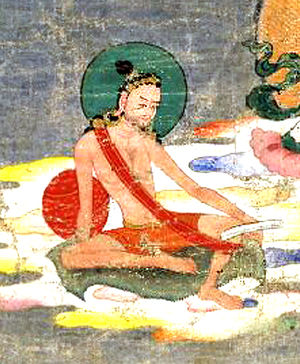docname
SherabDrime (talk | contribs) (New page: sangs rgyas sbas pa'i mgon (16th/17th centuries) in Tibetan. Buddhagupta-natha, a late Indian Siddha who visited Tibet and became one of the teachers of Jonang Taranatha. His own teac...) |
SherabDrime (talk | contribs) mNo edit summary |
||
| Line 1: | Line 1: | ||
[[Image:Buddhaguptanatha.jpg|thumb|Buddhagupta-natha, a detail from a Tara-yogini thangka]] | |||
sangs rgyas sbas pa'i mgon (16th/17th centuries) in Tibetan. Buddhagupta-natha, a late Indian Siddha who visited Tibet and became one of the teachers of Jonang [[Taranatha]]. His own teachers were Tirtha-natha and the Mahasiddha Shanti-gupta. The fact that an Indian Siddha should appear so late in Tibet, shows clearly that the often repeated statement of Buddhism having become extinct in India after the 12th century Muslim invasions, is quite incorrect. | sangs rgyas sbas pa'i mgon (16th/17th centuries) in Tibetan. Buddhagupta-natha, a late Indian Siddha who visited Tibet and became one of the teachers of Jonang [[Taranatha]]. His own teachers were Tirtha-natha and the Mahasiddha Shanti-gupta. The fact that an Indian Siddha should appear so late in Tibet, shows clearly that the often repeated statement of Buddhism having become extinct in India after the 12th century Muslim invasions, is quite incorrect. | ||
Also the famous scholar and yogin Vana-ratna (nags kyi rin chen, 1384-1468), teacher to such great Tibetan masters as Gö Lotsawa Shönu Pal ('gos lo tsA ba gzhon nu dpal, 1392-1481) and Thrimkhang Lotsawa Sönam Gyatso (khrims khang lo tsA ba bsod nams rgya mtsho, 1424-1482), who travelled to Tibet three times in the 15th century, is further proof of the ongoing practice and study of Buddhism in India after the onslaught of these invaders. | Also the famous scholar and yogin Vana-ratna ([[nags kyi rin chen]], 1384-1468), teacher to such great Tibetan masters as Gö Lotsawa Shönu Pal ('gos lo tsA ba gzhon nu dpal, 1392-1481) and Thrimkhang Lotsawa Sönam Gyatso (khrims khang lo tsA ba bsod nams rgya mtsho, 1424-1482), who travelled to Tibet three times in the 15th century, is further proof of the ongoing practice and study of Buddhism in India after the onslaught of these invaders. | ||
Vana-ratna was known as "the last great Indian scholar" to visit Tibet. Therefore one could certainly say that Buddhagupta-natha was "the last great Indian Mahasiddha" to do so. | Vana-ratna was known as "the last great Indian scholar" to visit Tibet. Therefore one could certainly say that Buddhagupta-natha was "the last great Indian Mahasiddha" to do so. | ||
Revision as of 21:05, 1 April 2009
sangs rgyas sbas pa'i mgon (16th/17th centuries) in Tibetan. Buddhagupta-natha, a late Indian Siddha who visited Tibet and became one of the teachers of Jonang Taranatha. His own teachers were Tirtha-natha and the Mahasiddha Shanti-gupta. The fact that an Indian Siddha should appear so late in Tibet, shows clearly that the often repeated statement of Buddhism having become extinct in India after the 12th century Muslim invasions, is quite incorrect.
Also the famous scholar and yogin Vana-ratna (nags kyi rin chen, 1384-1468), teacher to such great Tibetan masters as Gö Lotsawa Shönu Pal ('gos lo tsA ba gzhon nu dpal, 1392-1481) and Thrimkhang Lotsawa Sönam Gyatso (khrims khang lo tsA ba bsod nams rgya mtsho, 1424-1482), who travelled to Tibet three times in the 15th century, is further proof of the ongoing practice and study of Buddhism in India after the onslaught of these invaders.
Vana-ratna was known as "the last great Indian scholar" to visit Tibet. Therefore one could certainly say that Buddhagupta-natha was "the last great Indian Mahasiddha" to do so.
Buddhagupta-natha was the son of a rich merchant. -> more coming soon...
Primary Teachers
- Tirtha-natha
- Shanti-gupta
Primary Students
- Nirvana-shri-pada
- Purna-vajra-pada
- Taranatha
